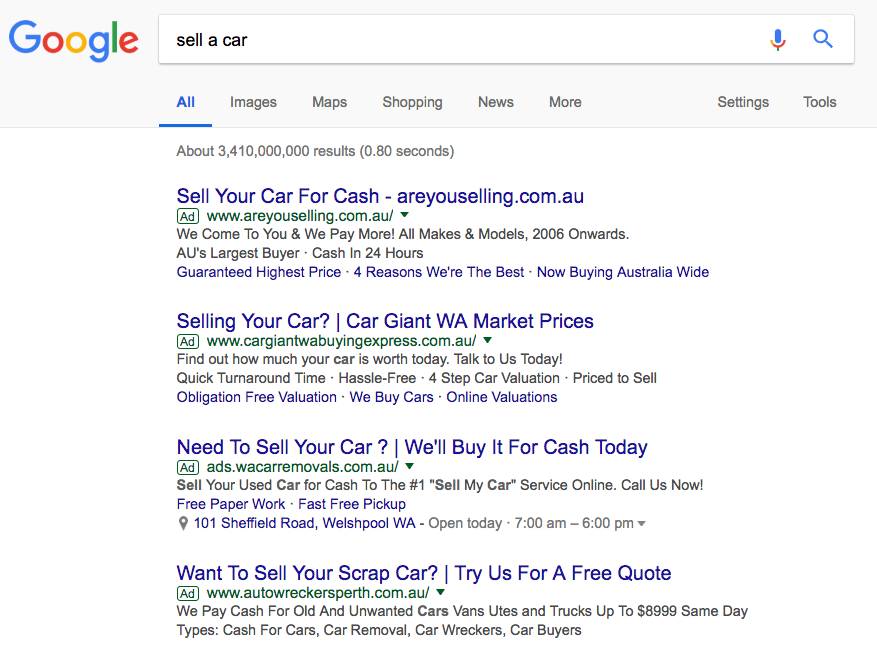A successful Google Ads (formerly known as AdWords) practice marketing campaign helps more patients find your practice online, resulting in increased bookings and a positive return on investment (ROI).
Google Ads positions your practice at the top of search results on Google, allows you to target patients who are ready to make a booking now, but you only pay when these potential patients click on your ad to visit your website or call you.
The Challenge
Knowing where to begin with Google Ads can be daunting for any healthcare practice. It’s not just a matter of ‘set and forget.’ Correctly optimising activity to ensure that you don’t waste any of your budget is a specialised skill in itself.
Practices frequently ask us how Google Ads activity can work for their business. The good news is, we’re here to help!
HealthEngine is the first and only Google Premier certified partner in Australia that specialises in health.
This means our team of Certified Google Ads Specialists are fully trained on the latest ways to create effective paid search marketing solutions tailored to your practice’s needs.
In fact, 96% of HealthEngine practices see a positive ROI within just 3 months of using Google Ads.
Thinking of trying Google Ads? We’ve compiled this introductory guide to the features and benefits.
What is Google Ads?
Also referred to as paid search, SEM (Search Engine Marketing) or PPC (Pay Per Click), Google Ads is an online advertising tool that allows you to bid for page placement on search results. Still not clear?
Let’s start with the basics.
When you conduct a Google search, you’ll notice that the top 2 to 4 slots are denoted as “Ad” in a small green box. These are listings where companies or small businesses have competitively bid to appear higher up the page. Here’s a simple example of a search for ‘sell a car’, where the top 4 results are all paid ads:

Google recently increased the number of paid ad slots at the top of the page, which has pushed the organic (unpaid) listings further down the results page. Appearing organically on the first page of search engine results can be almost impossible – particularly for small businesses.
As 75% of internet users never scroll past the first page of Google, securing first-page real estate has never been more critical in making your practice more visible to new and existing patients.
Running paid search ads is key to driving traffic or calls to your practice, making it one of the most important marketing channels you can have. And for GPs, Google healthcare data from the last 3 years reveals that search volumes peak during the winter flu season. So if you’ve never used Google Ads before, now is the perfect time to start testing it out.
We’ll take a look at all the benefits of partnering with HealthEngine for your next Google Ads campaign.
Benefits of AdWords
1) Attract more patients by appearing at the top of Google search results
With a Google Ads campaign, your business will attract more attention by appearing higher in search results. As soon as your Google Ads campaign goes live, your ads will start appearing for your chosen keywords – giving you the opportunity to promote your brand to an audience interested in your service.
We recently covered how to optimise your site for SEO. The goal of SEO is to improve your organic rankings. One of the things to bear in mind is that creating a decent level of organic search presence not only takes time (months or even years) but can also be very difficult, depending on the competitiveness of your industry and keywords.
So, whilst SEO is important for generating leads, a well optimised Google Ads campaign can work much faster and instantly increase your brand awareness and conversions.
2) Effective, local targeting
Show your practice to patients ready to make a booking – in the moment they are searching Google for the contact details of a nearby provider.
With its geo-targeting capabilities, Google Ads is a highly effective channel for reaching a local audience. You can target users searching on their mobiles for medical services in your suburb. Users will see your ads and click to reach your website or call your practice.
3) Control your advertising costs – pay for performance
You only pay when prospective patients interact with your ad – by clicking to either visit your website or call your business. So you only pay when your ads are working!
Campaigns are based around keywords – namely, the terms people are typing into Google when searching for a service. For example, “doctor in Subiaco”. Certain search terms are more commonly used by people than others, meaning they have ‘high volume’. As there are only a handful of paid advertising slots available on any search results page, competition for popular high volume keywords is high.
With paid search you have the ability to set and monitor your own keywords and budget, thereby reducing any overspending.
4) Flexible budgets that rollover – and no booking fees
Enjoy flexibility with your monthly budget based on results you want to see.
When setting up a campaign in Google Ads, you select a maximum CPC (cost per click) for every keyword in your account. Each campaign has its own budget, so depending upon the importance and performance of your campaigns you can adjust these budgets to maximise your return. And importantly, only spend as much as you wish to.
Plus, budget rolls over – any unspent amounts can be used the next month.
As a HealthEngine customer, you won’t pay any booking fees for all new patient bookings generated from your Google Ads campaigns.
5) Measurable results with monthly reporting
Like other forms of digital advertising, paid search arms you with the ability to track results from the initial impression (ie when the ad is shown or ‘served’) down to an actual conversion (purchase, web lead, call and so on).
Combined with the ability to control your campaign budget, AdWords allows you to see exactly what you’re spending per conversion. You can compare how different campaigns and keywords perform to determine where your money will be best spent, as well as which target audiences and ad variations provide the most conversions.
Google Premier Partner – ongoing support based in Australia
As outlined above, setting up an effective Google Ads campaign requires time and skill, with some marketing creativity and budget calculations thrown in. Ongoing monitoring and optimisation are also necessary for success. Without a digital background, it can be complex for a practice to navigate Google Ads on their own.
The good news is, HealthEngine is proud to be a Google Premier Partner. All HealthEngine customers using our Google Ads product receive dedicated support from our in-house team of Specialists. We can ensure your Google Ads marketing campaigns always stay fully optimised. Not only that, but by listing on the HealthEngine directory, you also benefit from our established high volumes of quality search rankings to boost your own listing even more.
Our blog also has a range of resources, including a more in-depth guide to setting up Google Ads campaigns. Or you can read how GPs on Bayview, Kelvale Medical Group, and Simply Teeth all achieved record ROI by partnering with HealthEngine on Google Ads.
Make yourself more visible to new and existing patients. Get in touch today to find out how we can help your practice scale the search engine summit.

